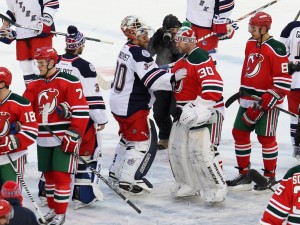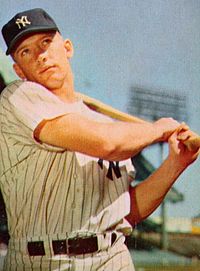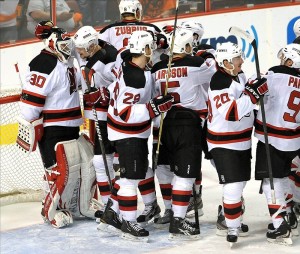Martin Brodeur stood just beyond what would normally be first base when the opening puck was dropped for his professional outdoor hockey game debut at Yankee Stadium. In what could be his final season and in likely the only outdoor appearance of his storied career, Brodeur had a chance to shine on the national stage as his New Jersey Devils battled their arch-nemesis the New York Rangers in the second game of the 2014 Coors Light Stadium Series.
Brodeur lasted forty minutes. As the snow started to fall in the second period, Brodeur and the Devils struggled and saw what was once a 3-1 lead vanish and become a 6-3 deficit. The new number one net minder in New Jersey, Cory Schneider, took control of the crease to open the third period as Brodeur took his spot on the bench. Surrendering six goals to the Rangers for the first time in his career and allowing a goal on all three of the final shots he faced, Brodeur’s outdoor debut ended with his team losing 7-3.

The Mick Makes History at the Original Yankee Stadium for the Final Time
Across the street at the original Yankee Stadium on September 25th, 1968, in a New York Yankees 3-0 loss to the Cleveland Indians Mickey Mantle, a Hall of Fame center fielder for almost his entire career started the game at first base. Nine innings later, after a walk in his final home plate appearance, Mantle stood in eerily the same spot that Brodeur sat as the third period closed when Indians third baseman Max Alvis caught a pop-fly off the bat of Mantle’s teammate, Roy White. Mantle’s final home game at Yankee Stadium ended with a 1-3 performance and the aforementioned walk. His final official at-bat at the Stadium was a strikeout. He would play two more games at Fenway Park before his career ended but didn’t register another hit. Yet, in a forgettable final season, Mantle managed to have one final hurrah.

On May 30th, 1968, in an afternoon match-up against the Washington Senators, Mantle played one of the most memorable games of his career in a Yankees 13-4 victory. Mantle went 5-5 with two homeruns and a double. He had five RBI and scored three runs. It was the first time since the 1962 season that Mantle had more than three hits in a game. It was the third and final time in his career he went 5-5, the fourth and last time he had five hits in a game, and was the first and only time he went 5-5 at Yankee Stadium. The legend’s legacy was already in stone but he managed to provide one final moment of glory as his career dwindled to a close.
Martin Brodeur Continues to Excel as He Enters His 40’s
Does Brodeur have one final hurrah remaining in his legendary glove? Does his mask have enough magic left in the horned and tailed “J”? While he has lost the starting role in the crease again, presumably for good this time, Brodeur has shown before that the end for him has always been predicted a bit prematurely.
In 2010, Brodeur struggled in a 3-2 victory over Switzerland during the 2010 Winter Olympics. After giving up four goals in a 5-3 defeat to the United States in his next game, Brodeur was forced to surrender the starting role to Roberto Luongo. Luongo went on to lead Canada to their second gold medal in three Olympics. Of course, Brodeur led Canada to the former gold medal. Upon the resumption of the NHL schedule, Brodeur refused to allow the benching to affect his own performance with the Devils. In the final nineteen games of the season, Brodeur compiled a record of 11-5-3 with a pair of shutouts and gave up two goals or less in four of his defeats (regulation or overtime). Brodeur led the league in wins with 45 and shutouts with 9 for the 2009-10 season. The Devils lost in five games to the Philadelphia Flyers in the opening round of the playoffs but Brodeur’s harsh postseason statistics were more an effect of the Devils brutal play rather than the cause.
The 2010-11 season was a tale of two halves for New Jersey. The first half was an absolute disaster in which the Devils had a record of 10-29-2. In 28 games, Brodeur had just five wins and a save % of .886. After getting pulled for Johan Hedberg against the Carolina Hurricanes on January 1st, 2011, Brodeur asked not to start another game until he felt he was able to perform at a high enough level to win. As the hockey world began to wonder if the end of Brodeur had finally arrived, Brodeur came back with a vengeance three games later. In a reversal of fortunes, Brodeur took over in relief of Hedberg in a battle in Philadelphia against the Flyers and stopped all 19 shots he faced. However, the Devils still lost 2-1 in the final game of their first half. The second half opened with the Devils winning 6-3 against the Tampa Bay Lightning at the Prudential Center with Brodeur in goal. Brodeur won 18 of 28 games in the second half of the season and had a .920 save %. He helped the Devils rise from the basement of the Eastern Conference and 27 points behind the last playoff spot as of January 13th to within 6 points in 10th place on March 15th. The Devils white hot second half faded in the final two weeks and the Devils narrowly missed completing a rally for the record books.
Brodeur kept the prognosticators quiet about his own demise during the 2011-12 season even though he was playing out the final season of the six-year extension he signed during the 2005-06 campaign. Brodeur finished with a record of 31-21-5 and thus reached another milestone as he won at least 30 games for the 14th season in his career. Then during the 2012 Stanley Cup Playoffs, Brodeur spearheaded the underdog Devils to the Stanley Cup Finals and in the process pulled off a number of accolades. He won Game 4 of the Eastern Conference Semifinals on his 40th birthday becoming the first goaltender to appear in a playoff game as a teenager and beyond his 40th brithday. He also defeated the 2012 Vezina Trophy winner for NHL’s best goaltender in Henrik Lundqvist as the Devils defeated the Rangers in six games in the following series. Brodeur gave up just one goal in regulation during both Game 1 and Game 2 of the Stanley Cup Final but the Devils offense was shut down by Jonathan Quick and the Los Angeles Kings took both games in overtime. The Devils lost the Final in six games but Brodeur showed he was far from done.

The Beginning of the End for the Greatest Goaltender in the History of the NHL?
Brodeur missed a dozen consecutive games during the heart of the lockout shortened 2012-13 season with a back injury and the Devils failed to make the postseason for the second time in three seasons. Despite his best GAA (2.22) since 2007-08, Brodeur’s save % dipped to .901, the lowest mark of any full season during his career. Entering the final season of his latest contract, Brodeur expected to be the number one goaltender once again but Devils General Manager Lou Lamoriello traded for Cory Schneider during the 2013 NHL Entry Draft.
A star in the prime of his career as a member of the Vancouver Canucks, Schneider instantly became the first goaltender to threaten Brodeur’s two-decade long stranglehold of the number one spot on the depth chart in the crease for New Jersey. Brodeur vowed to stay the starting goaltender but a rough start to the 2013-14 season led Devils coach Peter DeBoer to start Schneider against the Rangers on October 19th. This was the first time since 1993 that a healthy Brodeur did not start against his bitter rival. Brodeur conceded that the crease now belonged to Schneider but Brodeur fought to regain control. When Schneider landed on the IR briefly after he took the top spot, Brodeur took over and won seven of his next eight starts including a victory at Madison Square Garden. However, Brodeur has won just six of his last sixteen starts since that hot stretch including the loss at Yankee Stadium. Schneider has started six of the Devils last nine games and two of Brodeur’s starts, one in Montreal against the Canadiens and the other being the outdoor game, were more because of sentimental reasons than to give Schneider a rest. With the Devils fighting to make the playoffs, Schneider will undoubtedly start the majority of the games for them from now until the end of the regular season.
Brodeur proved in 2010 that although he lost a starting job on the Canadian Olympic team, he was still capable of performing at a high level in the NHL. He fought back against one of the roughest times of his career during the latter half of the 2010-11 season. He came within two games (two overtime goals?) of winning his fourth Stanley Cup in 2012. He lost the starting job with the Devils once already this season but regained it. He won in what could have been his final game at the Montreal Canadiens on January 14th.
Martin Brodeur received a standing ovation in Montreal after being named first star on January 14th, 2014:
http://youtu.be/8WJMy9J3Vks?t=13m17s
Can Martin Brodeur Provide One More Legendary Moment?
Brodeur’s legacy is already written. He had a chance to add a historical chapter at Yankee Stadium but was not able to finish the game let alone stop any of the three final shots that came his way. Does he have one final magical moment left? Yogi Berra famously uttered the phrase, “It ain’t over till it’s over.” Is it over for Martin Brodeur? Or will the winningest goaltender in the history of the NHL have one final hurrah just like Mickey Mantle did during one afternoon in the spring of 1968?